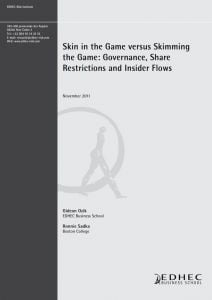

Skin in the Game versus Skimming the Game: Governance, Share Restrictions and Insider Flows
Hedge-fund managers justify share restrictions as means of protecting the common interest of the shareholders. However, this paper advances that such restrictions can adversely induce information asymmetry between managers and their clients about future fund flows. The paper demonstrates that share-restricted funds with recent outflows underperform funds with recent inflows by about 5.6% annually over 1998—2008. No such return spread is observed for funds with low-share restrictions. As managers may also act as investors in their own funds, the information asymmetry potentially allows them to profit by trading in advance of their clients.
Author(s):
Summary:
Hedge-fund managers justify share restrictions as means of protecting the common interest of the shareholders. However, this paper advances that such restrictions can adversely induce information asymmetry between managers and their clients about future fund flows. The paper demonstrates that share-restricted funds with recent outflows underperform funds with recent inflows by about 5.6% annually over 1998—2008. No such return spread is observed for funds with low-share restrictions. As managers may also act as investors in their own funds, the information asymmetry potentially allows them to profit by trading in advance of their clients.
Register to download PDF
Register/Log in| Type : | Working paper |
|---|---|
| Date : | 11/07/2011 |
| Keywords : |
Alternative Investments |

